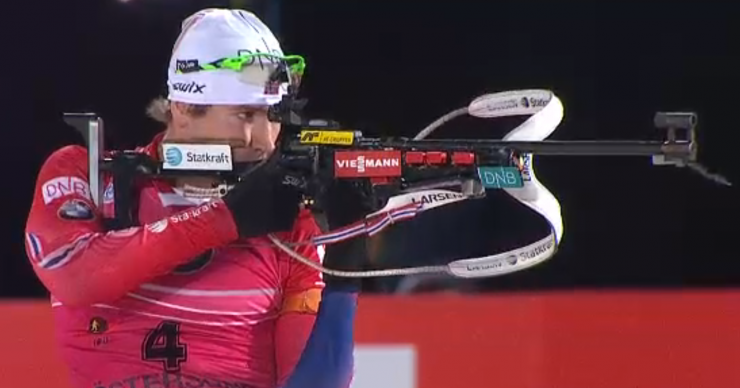
Emil Hegle Svendsen said earlier this week that the 20 k individual race in Östersund, Sweden, would separate “men from mice.”
If that’s the case, then Svendsen is definitely a man. The Norwegian biathlete, 11-time world champion, four-time Olympic gold medalist, and the third-winningest man in World Cup history, took his 36th win in dominating fashion, beating runner-up Serhiy Semenov of Ukraine by one minute and 17 seconds.
“It’s insanely amazing go get started this way,” Svendsen told Norwegian broadcaster NRK. “I followed the plan I’ve had success with before. And it worked again.”
He turned in a masterful performance, hitting all 20 of his targets – the only man to do so, which is a big advantage in the format which penalizes each missed shot with a minute of added time.
Rival Martin Fourcade of France couldn’t even come close, missing four targets in the very first shooting bout and then basically phoning it in. He placed 81st, and had to hand Svendsen the yellow leader’s bib that he started with as last season’s overall World Cup champion.
“I’m happy to give it to Emil today,” Fourcade told NRK. Svendsen reported that Fourcade had tossed him the jersey while they were in the changing area.
The wind was variable in the Östersund stadium, which was why so many competitors tripped up. There’s also the issue that the 20 k is the most grueling race format, and a tough way to kick off the season.
“I have been thinking, and the last time I cleaned in a 20 k was in my first World Cup victory in 2007, under similar conditions,” Svendsen said in a post-race press conference. “But I was a bit lucky today with the wind especially in standing and that made it quite easy to hit all 20. Still, it does take some skill to do that… I have been feeling really good in the shooting range this winter.”
His perfect shooting was acknowledged by competitors as something fairly incredible.
“Emil delivered in the top ten or top five of his best races in his career,” said teammate Ole Einar Bjørndalen, who knows a thing or two about best performances. “It is a fantastic achievement to shoot down all 20 targets in the shooting today.”
Svendsen knew, however, that he had to a large extent capitalized on his competitors’ errors. He had sixth-fastest course time, but was still well behind teammates Johannes Thingnes Bø, who finished eighth, and sixth-placeBjørndalen. He knows that Fourcade isn’t going to miss four targets right off the bat every race, nor will his teammates always pick up three or four penalties apiece. It will get harder and harder to win as the season goes on.
“It was not good enough; I need to catch some seconds if I expect to be on the podium in the sprint,” Svendsen admitted. “But it is like this every season with me. It takes a couple of races to warm up; I am like an old diesel engine.”
Second-place Semenov made it clear that he loves the format: his only other podium also came in the 20 k, two seasons ago in the pre-Olympic test race in Sochi, Russia.
“I am a bit slow, but I can go at the same speed for the whole distance,” he explained in the press conference. “But this race was hard; I could hardly wait to get to the finish line.”
Third-place Michal Slesingr was almost another minute behind Semenov; both men, as well as Erik Lesser of Germany, had one penalty. Lesser was a late starter and made a charge at the podium but came up just three seconds short of the Czech veteran’s time.
Most of the other names in the top ten are familiar, previous podium finishers, with one exception: Quentin Fillon Maillet of France. The 22-year-old turned in his best performance yet and, like Lesser, as a late starter was able to surprise when he displaced American Tim Burke out of the top ten.
As for Svendsen, his performance cast doubt on the comments he had made in the off-season about feeling a lack of motivation to continue with biathlon.
“Winning makes you motivated and makes you want to continue for a long time,” he said in the press conference. “Biathlon is fun and to compete is fun. As long as it is fun, I will continue.”
Chelsea Little
Chelsea Little is FasterSkier's Editor-At-Large. A former racer at Ford Sayre, Dartmouth College and the Craftsbury Green Racing Project, she is a PhD candidate in aquatic ecology in the @Altermatt_lab at Eawag, the Swiss Federal Institute of Aquatic Science and Technology in Zurich, Switzerland. You can follow her on twitter @ChelskiLittle.



